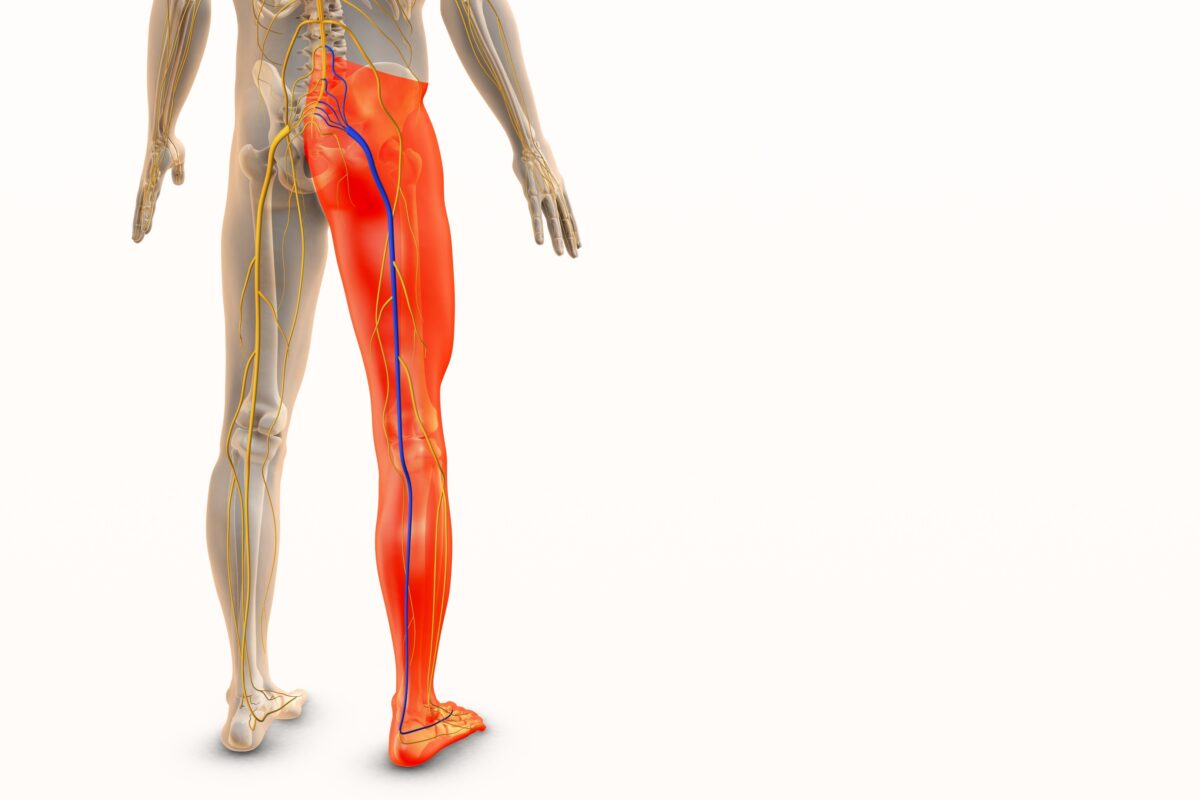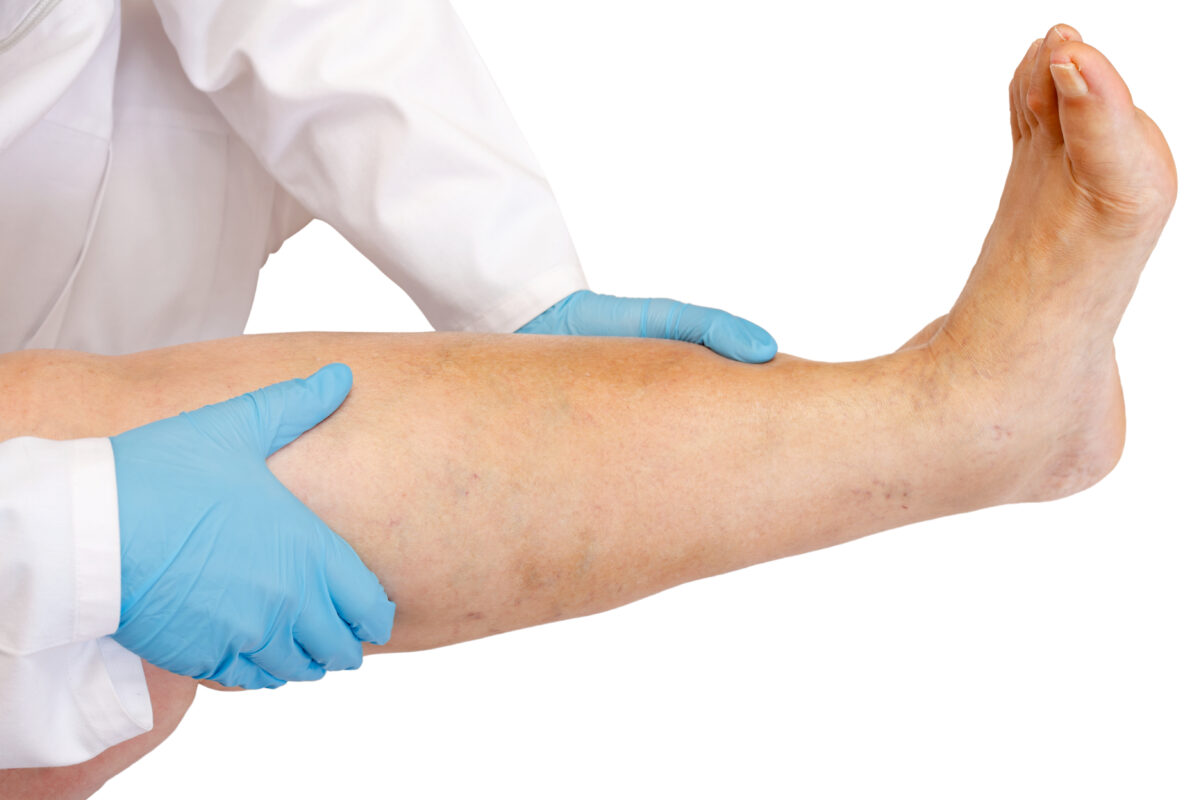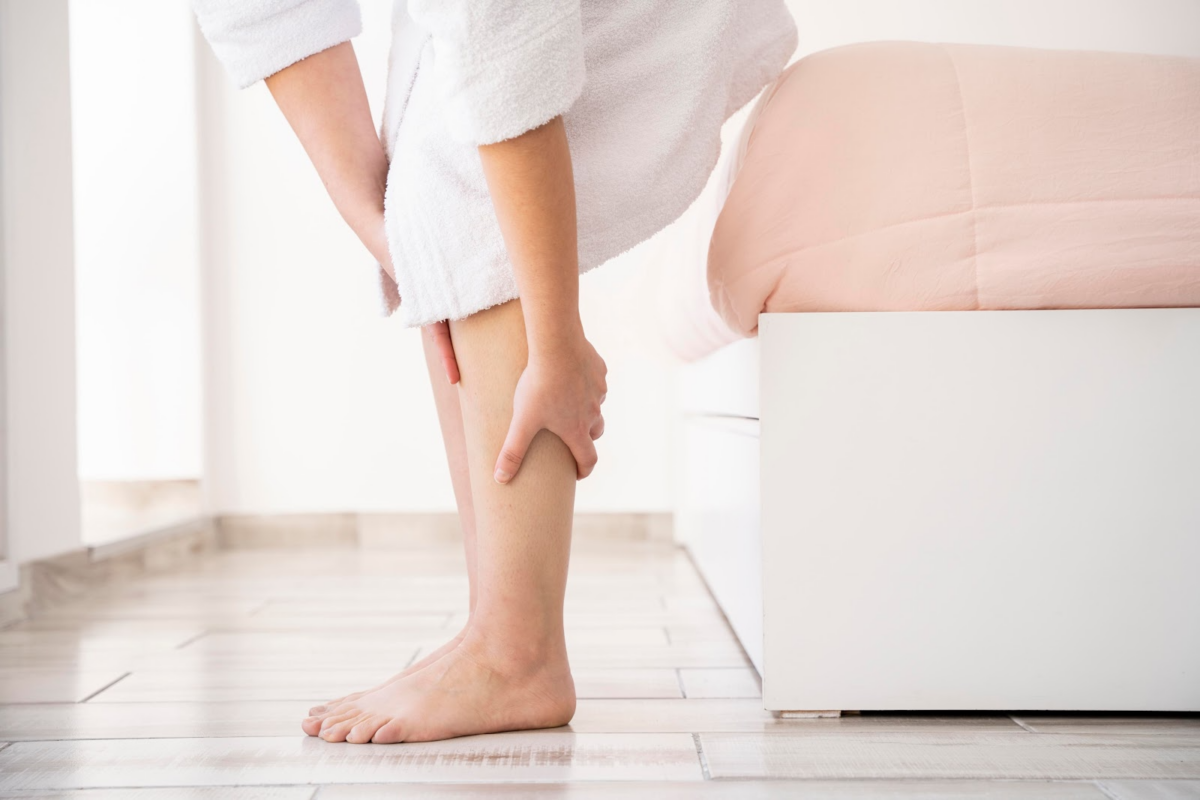It’s late, you’re in bed, and just when your body should be winding down, your legs start to ache. The discomfort might feel like a dull throb or a deeper pain that lingers and keeps you from falling asleep.
For many people, leg pain becomes a regular issue that disrupts sleep and affects energy during the day.
In this guide, we’ll explore what causes night leg pain, how it differs from daytime soreness, and what you can do to get relief. We’ll also cover warning signs to watch for and the treatments that can help you rest easier.
Common Symptoms of Aching Legs at Night
When you experience leg pain at night, it can feel frustrating and confusing. You might notice a steady ache or uncomfortable sensations that seem to show up only when your body is trying to rest. This kind of nocturnal leg pain can affect your daily life, making sleep difficult and draining your energy the next day.
What Does Night Leg Pain Feel Like?
The pain varies from person to person. Some feel:
- A deep ache in the leg muscles.
- Sharp or intense pain in one area.
- Throbbing or pressure that builds gradually.
- Muscle cramps that lock up your calves or thighs.
These symptoms might last a few seconds or linger for hours. In severe cases, you might even struggle to fall asleep or wake up several times each night.
Nocturnal leg cramps can be intense enough to make you jump out of bed. These cramps occur when your muscles, most often in the calves, suddenly contract and tighten without warning. They’re often associated with muscle fatigue, dehydration, certain medications, or imbalances in minerals such as magnesium or potassium.
Leg Cramps vs. Aching Legs
Leg cramps are typically brief, sharp, and sudden, and they often improve with gentle stretching or massage. Aching legs, on the other hand, usually involve a dull, persistent discomfort that can last for hours. This ongoing pain may indicate an underlying issue, such as poor circulation or nerve problems.
Pregnant women may experience more frequent leg cramps and discomfort due to changes in circulation and increased pressure on the leg muscles. However, people with sedentary lifestyles, certain medical conditions, or circulatory issues can also be affected.
When Should You Worry About Leg Pain at Night?
Some nighttime pain fades on its own. But if you have common symptoms like swelling, burning, or pain that always show up in the same affected leg, it’s time to take it seriously. These may be signs of an underlying medical condition such as deep vein thrombosis, nerve damage, or peripheral neuropathy.
Other red flags include:
- Discoloration or skin changes.
- Muscle spasms that happen often.
- Pain that gets worse after long periods of sitting or standing.
- A visible vein that feels hard or hot.
These warning signs may indicate problems such as varicose veins, blood clots, or even a spinal cord injury. If you notice sudden swelling or sharp pain with no clear cause, seek immediate medical attention.
Why Do I Get Leg Pain at Night?
There are many reasons your legs might ache more at night. For some, it’s related to daily strain or muscle fatigue. For others, the issue runs deeper and involves circulation, nerves, or long-term health conditions.
Poor Blood Flow
When blood doesn’t circulate properly, your legs can feel heavy, sore, or tight. Conditions like peripheral artery disease or coronary artery disease can limit oxygen flow to your tissues, leading to pain during rest. You might also notice cold feet, numbness, or weakness after sitting for a while.
People with high blood pressure or those taking blood thinners should speak with their doctor about circulation. Pain caused by poor circulation often gets worse when you lie down, making nighttime the most uncomfortable part of the day.
Muscle Strain or Overuse
If you stand, walk, or exercise heavily, you might go to bed with overworked muscles. Muscle strain builds gradually and shows up as dull pain or tightness. Without enough rest, your leg muscles may become sore or achy by nightfall. A warm shower or light massage may help them recover.
Small changes in sleep habits, such as sleeping with your legs flat, can also make this kind of pain worse. Supporting your legs with a pillow may reduce pressure and improve blood flow.
Nerve Damage and Pinched Nerves
Sometimes nerve pain feels like burning, tingling, or an electrical shock. A pinched nerve in your back or leg can send discomfort down into your thigh or calf. People with diabetes or rheumatoid arthritis are more likely to develop nerve damage or peripheral neuropathy over time.
If you often feel pain in the same spot or notice numbness, it’s worth looking into. Nerve-related pain usually doesn’t improve with stretching or rest, and it may worsen as the night goes on.
Other Underlying Health Conditions
Certain medical conditions can increase the risk of nighttime leg pain, including:
- Restless legs syndrome (RLS), which causes an irresistible urge to move the legs, is often accompanied by sensations like tingling or crawling. While RLS is usually not described as painful, the constant need for muscle movement can interfere with sleep.
- Kidney failure, which can lead to fluid and mineral imbalances, sometimes results in muscle cramps.
- Vitamin D or iron deficiency can affect nerve and muscle function and may contribute to discomfort or cramping.
- Side effects from certain medications disrupt the balance of minerals in the body.
In many cases, nocturnal leg pain may reflect the body’s need for more rest, improved nutrition, or changes in daily habits. However, it can also be a sign of more serious health issues that require professional evaluation and care.
How to Relieve Aching Legs at Night
Nighttime leg pain can leave you tossing, turning, and exhausted the next day. The good news is that there are ways to calm the discomfort and help your body rest. Whether the pain is mild or more persistent, small changes can make a big difference.
Simple Changes You Can Make Today
Adjust your evening routine and do the following:
- Try gentle stretching before bed to improve flexibility and reduce tightness.
- Elevate your legs with a pillow to support blood flow back toward your heart.
- If you notice swelling, use a heating pad for stiffness or a cold compress.
- Maintain a balanced diet rich in magnesium and potassium, which support muscle health.
If your legs feel heavy or jumpy at night, you may be dealing with restless legs. Stretching, movement breaks during the day, and reducing caffeine can sometimes help manage this condition.
Over-the-Counter Relief Options
Sometimes pain needs a little more support. Anti-inflammatory medications like ibuprofen or naproxen can help reduce swelling and soreness. Muscle rubs or magnesium-based creams may also offer relief for surface tension and mild cramping.
For sudden night leg cramps, try flexing your foot gently upward toward your body or standing and walking for a minute. This encourages movement and helps reset the muscle.
When Home Remedies Aren’t Enough
If your pain keeps returning or interferes with your sleep regularly, there may be an underlying health condition at play. Chronic pain that doesn’t improve could signal issues like blood clot risk, rheumatoid arthritis, or another circulatory or nerve issue.
If home remedies aren’t working, you need to see a healthcare provider. A proper diagnosis gives you better treatment options, especially if you suffer from diabetes or kidney disease.
Get Lasting Relief From Nighttime Leg Pain
If leg discomfort keeps you up at night, pay attention. While occasional pain is one of the most common complaints, frequent discomfort often points to something more serious.
Wellness and Pain focus on treating the whole person, not just the symptoms. Led by reliable doctors, the team uses advanced diagnostics, personalized care, and holistic therapies to support long-term healing and well-being.
Whether you need to relax muscles, improve circulation, or manage a chronic condition, Wellness and Pain can help create a treatment plan that remedies severe leg pain.
They also guide patients through lifestyle improvements, including quitting smoking, weight management, and nutrition, all of which support circulation and reduce inflammation.
You deserve comfort and clarity. Schedule a consultation with Wellness and Pain and start enjoying more restful nights.
FAQs About Aching Legs at Night
How do I stop my legs from aching at night?
Make a few changes to your bedtime routine. Light movement, gentle stretching, and proper hydration can help your muscles settle down. If the pain is linked to a pinched nerve or peripheral neuropathy, you may need targeted care from a medical provider.
Why do I get aching legs in bed?
Leg pain that shows up only at night can be related to reduced activity, muscle strain, or decreased circulation during sleep. For some people, the issue may be connected to restless legs syndrome or another existing health issue. Your sleeping position, blood pressure, or past injuries may also be contributing. Identifying the trigger is the first step toward relief.
What are aching legs a symptom of?
Aching legs can be a symptom of many different issues, from muscle strain and nerve damage to deep vein thrombosis or blood clot complications. In other cases, the pain may point to broader medical conditions like diabetes, vitamin deficiencies, or even reactions to certain medications.
What am I lacking if my legs ache?
You may be low on key nutrients like magnesium, potassium, or vitamin D. These are essential for muscle function and nerve health. Chronic leg aches may also signal an imbalance caused by kidney failure, underlying health conditions, or side effects from medication.




















